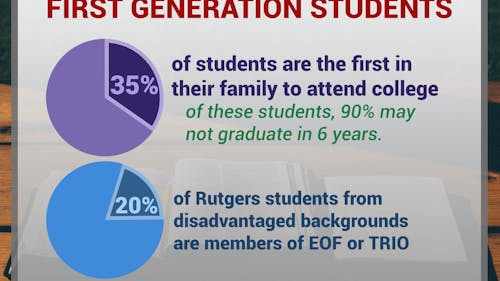Rutgers program helps 1st generation college students graduate

More than one-third of students in higher education are the first in their family to attend college. Nearly 90 percent may spend up to six years in college to not even graduate with a degree. A new initiative spearheaded by Chancellor Richard L. Edwards is working to help students overcome these statistics.
RU-1st is focused on increasing graduation rates of first-generation, high-need or underrepresented students and hopes to spark conversations on issues of equity and access on campus.
Edwards ensures the Chancellor-level committee offers programs, courses and robust infrastructure developed in the University for the population of first-generation or underrepresented students. The committee also ensures funding for RU-1st, develops tools for these students to measure their success and develops practices which encourages and supports first-generation students.
The organization, which has been around for just under a year, coordinates the support for first-generation students by helping them develop a sense of community at Rutgers—New Brunswick.
“Rutgers remains a diverse institution, we want to make sure every constituent has the knowledge they need to succeed,” said James Whitney, assistant vice chancellor of Undergraduate Academic Affairs. “We recognize that more support might be necessary for our students who aren’t supported by state or federal grants.”
Roughly 20 percent of Rutgers—New Brunswick students who come from a disadvantaged background receive help through the Educational Opportunity Fund (EOF) or TRIO Financial Aid Programs, according to the RU-1st website. The RU-1st initiative was started to find help for the other students who may not be able to receive funding from these programs.
"(These) great programs served as a model for graduating students," Whitney said.
The School of Arts and Sciences EOF program, which is the largest in New Jersey, holds the same retention and graduation rate of 74 percent, is on par with the University, he said.
“If this works for these students, why don’t we try to expand these services and offer it to more students who need it?” he said.
RU-1st offers a type of liaison at every school or department for these students if they ever are in need of help.
This is an initiative for students who want to be involved, said Jakora Holman, director of Planning and Operations in Student Access and Educational Equity of RU-1st.
“(Students) can come and show up and be a part of this community where they can find support,” she said. “It’s really an initiative for students to find a community of support as well as resources at this school.”
Students can call the number and talk to a person that can help them and offer resources, Whitney said. This relays information and access to students who may not otherwise be connected on all levels.
RU-1st just held a high-impact event called “Community of Color Programming,” which promotes an inclusive environment to Rutgers’ population through retention programming, events and other opportunities for advising. Whitney said this event generated about 1,000 students.
“We had all races come out and come together to meet administrators,” he said.
RU-1st also recently began the Paul Robeson Leadership Institute, a summer experience for first-year students who are underrepresented or low-income. The program focuses on giving these students a sense of leadership, how to transition to college, and a dedicated advisor that helps them through their undergraduate studies until graduation. These students also receive 10 semesters of grant funding.
Twenty of these students were black or Latino males, who Whitney said have a harder time maintaining an equal retention and graduation rate to universities across the country.
“We are looking at these high-risk populations and trying to help them stay and improve their rates toward retention and graduation. We believe we’ve improved coordination and sharing with high level staff and providing communities for students to come together,” he said.
On the first Friday of each month, "1st Fridays," allow students to create a dialogue with staff on campus and address some of the issues they have. Lately, these issues are more national conversations in terms of violence in America and issues in diversity, Whitney said.
“There’s a place they can come talk and bond, but it’s also a place for skill development, personal development,” he said.
Holman said all these initiatives and events help bring and continue a dialogue to campus.
“Right now, this is giving students a chance to take ownership of their identity and pride of being a first generation student,” she said. “It helps students not feel alone in this journey, there are other students here and other faculty and staff here to support them on campus.”
While Rutgers is not the first university to offer an initiative like this, Whitney said this is an important step in the University’s 250th year.
“I believe we are unique because we are among the largest and we have such institutional examples already. We have 50 years of proof and success this model works with our EOF and TRIO programs,” Whitney said. “Now we’re expanding upon that.
Sophie Nieto-Munoz is a School of Communication and Information senior majoring in journalism and media studies and Italian. She is an associate news editor for The Daily Targum. You can find her on Twitter @snietomunoz for more.



